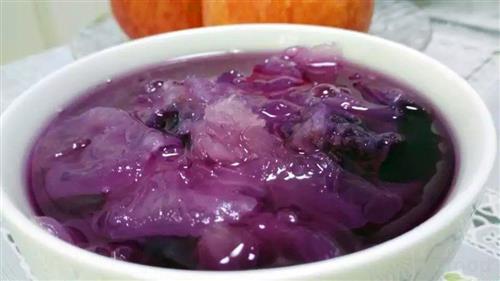Leading Word: Nowadays, people have high demands on quality of life and quality of food. Not only is it delicious or not, it is more about what nutrients the diet can bring to the body. Purple sweet potato has been hot for the past two years, not only because it has the nutrition and delicious taste of the potato, but also because it has charming purple and purple health benefits for everyone. Here are five kinds of purple sweet potato effects, let you fall in love with it.

1. Prevent constipation
The content of cellulose in purple sweet potato is very high. This kind of material can increase the volume of feces, promote gastrointestinal motility, clean up mucus, gas accumulation, and putrefaction in the intestinal tract, and remove toxic substances and carcinogens in the feces, so as to maintain Smooth bowel movements improve the digestive tract environment and prevent gastrointestinal diseases.
2. Slimming
Purple sweet potato stem tip leaves are rich in vitamins, proteins, trace elements, edible fiber and soluble non-oxidizing substances. Regular consumption of purple has many effects such as slimming, bodybuilding and fitness anti-cancer. Therefore, the purple sweet potato has good health care effects from the shoot tip young leaves to the potato chips. It is the most important health food in green, pollution-free and organic foods.
3. Antioxidant effect
21 kinds of alcohol extracts extracted from purple potato meat were used to carry out experiments. The results showed that the purple flower pod contained in purple sweet potato was the strongest in the ability to scavenge superoxide free radicals, and this ability was related to the total phenolic amount in purple sweet potato. Increase and increase. At the same time, the flower color in purple sweet potato can effectively prevent the lipid peroxidation caused by the automatic oxidation of linoleic acid.
4. Anti-cancer, anti-cancer
Purple sweet potato contains abundant protein, 18 kinds of amino acids necessary for human body, 8 kinds of vitamins such as vitamins A, B and C, and 10 kinds of natural minerals such as phosphorus and iron. Among them, the content of iron and selenium is the most abundant. Selenium and iron are essential elements in the body's anti-fatigue, Anti-Aging, and blood-supplementing activities. In particular, selenium is known as the "anti-cancer king," and the element is easily digested and absorbed by the body and can remain in the serum to repair the heart muscle. The body's immunity removes free radicals from the body, inhibits the division and growth of cancer cells, and prevents the occurrence of cancers such as stomach cancer and liver cancer.
5. Prevention of cardiovascular and cerebrovascular diseases
Sweet potatoes are rich in potassium, radish, folic acid, Vitamin C, and vitamin B6. These five components help prevent cardiovascular and cerebrovascular diseases. Potassium helps balance the body's cellular fluids and electrolytes, maintaining normal blood pressure and heart function. Carotene and vitamin C have anti-lipid oxidation and prevent atherosclerosis. Supplementation of folic acid and vitamin B6 helps reduce blood levels of homocysteine, which damages arteries and is an independent risk factor for cardiovascular disease.
Vitamin
Vitamins are a type of trace organic substances that humans and animals must obtain from food in order to maintain normal physiological functions. In terms of physiological functions, vitamins are neither a raw material for tissues nor a substance for supplying energy, but they are an indispensable substance for the body. It has many types and different chemical structures. Most of them are the components of the coenzyme (or prosthetic group) of certain enzymes. They are the indispensable compounds for maintaining the normal growth (growth, health, reproduction and production function) of the body. It plays a catalytic role in the body to promote the synthesis and degradation of major nutrients (proteins, fats, carbohydrates, etc.), thereby controlling metabolism. Vitamins are essentially low-molecular organic compounds. They cannot be synthesized in the body, or the amount synthesized is difficult to meet the needs of the body, so they must be supplied from the outside. The daily requirement of vitamins is very small (usually measured in milligrams or micrograms). They are neither a raw material for body tissues nor a substance for energy supply in the body. However, they do not regulate material metabolism, promote growth and development, and maintain physiological functions.
Vitamin K2 MK-7, Vitamin C, Vitamin E, Vitamin K2, Vitamin H, Vitamin D3
Xi'an Gawen Biotechnology Co., Ltd , https://www.ahualynbio.com